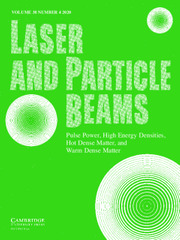No CrossRef data available.
Article contents
Induction linac drivers for heavy ion fusion
Published online by Cambridge University Press: 09 March 2009
Abstract
The Heavy Ion Fusion Accelerator Research (HIFAR) program of the U.S. Dept. of Energy has for several years concentrated on developing linear induction accelerators as Inertial Fusion (IF) drivers. This accelerator technology is suitable for the IF application because it is readily capable of accelerating short, intense pulses of charged particles with good electrical efficiency. The principal technical difficulty is in injecting and transporting the intense pulses while maintaining the necessary beam quality. The approach used has been to design a system of multiple beams so that not all of the charge has to be confined in a single beam line. The beams are finally brought together in a common focus at the target. This paper will briefly present the status and future plans of the program, and will also briefly review systems study results for HIF.
- Type
- Research Article
- Information
- Copyright
- Copyright © Cambridge University Press 1990


